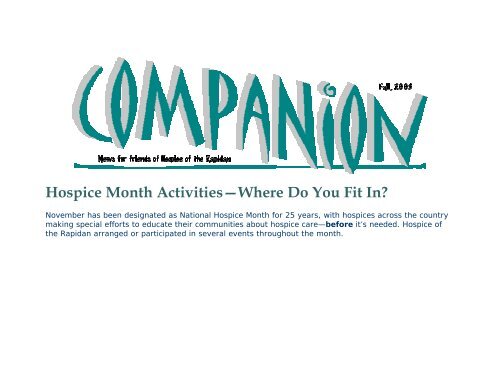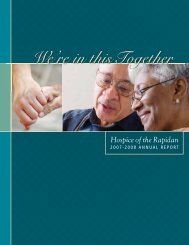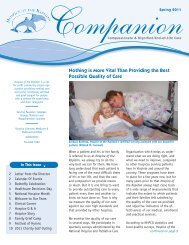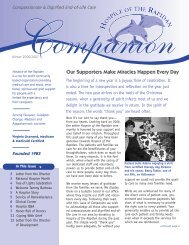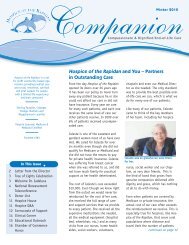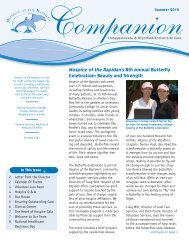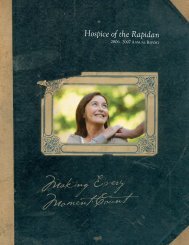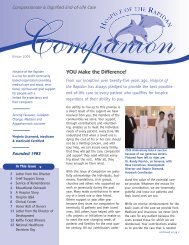Fall 2003 - Hospice of the Rapidan
Fall 2003 - Hospice of the Rapidan
Fall 2003 - Hospice of the Rapidan
Create successful ePaper yourself
Turn your PDF publications into a flip-book with our unique Google optimized e-Paper software.
<strong>Hospice</strong> Month Activities—Where Do You Fit In<br />
November has been designated as National <strong>Hospice</strong> Month for 25 years, with hospices across <strong>the</strong> country<br />
making special efforts to educate <strong>the</strong>ir communities about hospice care—before it’s needed. <strong>Hospice</strong> <strong>of</strong><br />
<strong>the</strong> <strong>Rapidan</strong> arranged or participated in several events throughout <strong>the</strong> month.
Houck Has a Helping Hand<br />
Following a “Meet <strong>the</strong> Candidates” breakfast at Aberdeen<br />
Barn in Culpeper October 23 rd , Virginia State Senator<br />
Edd Houck signed a proclamation acknowledging<br />
November as National <strong>Hospice</strong> Month and encouraging<br />
citizens <strong>of</strong> Senate District 17 “to increase <strong>the</strong>ir awareness<br />
<strong>of</strong> <strong>the</strong> importance and availability <strong>of</strong> hospice services.”<br />
(That would be Edd on <strong>the</strong> left, handing over <strong>the</strong> signed<br />
proclamation to our fearless leader, Kathy Clements.)<br />
Dinner and a Show<br />
<strong>Hospice</strong> <strong>of</strong> <strong>the</strong> <strong>Rapidan</strong> was involved in <strong>the</strong> formation <strong>of</strong> <strong>the</strong> Central Virginia Palliative Care Initiative<br />
(CVPCI), a coalition formed to educate <strong>the</strong> public about end-<strong>of</strong>-life issues in conjunction with <strong>the</strong> PBS<br />
series “On Our Own Terms: Moyers on Dying” in 2000. The CVCPI organizes one to three community<br />
education events each year, including <strong>the</strong> day-long workshops encompassed in <strong>the</strong> Compassion Sabbath<br />
programs.<br />
With a $5,000 grant from Rallying Points (a Last Acts initiative), funds from <strong>the</strong> Compassion Sabbath<br />
workshops in March, and sponsorship from <strong>Hospice</strong> <strong>of</strong> <strong>the</strong> <strong>Rapidan</strong>, <strong>the</strong> CVCPI was able to arrange for a<br />
pr<strong>of</strong>essional performance <strong>of</strong> Waltzing <strong>the</strong> Reaper November 6 th , starting with dinner and ending with<br />
dessert and discussion—all at no cost to <strong>the</strong> participants. Space was available for 140 people, and by<br />
November 1 st <strong>the</strong>re was a waiting list! Obviously, <strong>the</strong> recent publicity <strong>of</strong> cases such as Terri Shiavo’s<br />
have made people more aware <strong>of</strong> <strong>the</strong> wisdom <strong>of</strong> having advance medical directives.
Waltzing <strong>the</strong> Reaper is a one-woman show, written by P. Paullette MacDougal and performed by Judith<br />
Gantly, abbreviated as “A once-vital, still witty woman, Vera has been resuscitated despite her Living<br />
Will. Now she must depend on a relative she never liked to get her out <strong>of</strong> <strong>the</strong> hospital and home, where<br />
she can make peace with her family and die with dignity, with <strong>the</strong> help <strong>of</strong> <strong>Hospice</strong>.” The synopsis does not<br />
express <strong>the</strong> humor or emotion <strong>of</strong> <strong>the</strong> play, nor does it explain its thought-provoking aspects that leave<br />
everyone in <strong>the</strong> audience wondering what <strong>the</strong>y would do in a similar situation—from ei<strong>the</strong>r perspective,<br />
ei<strong>the</strong>r as <strong>the</strong> dying person or <strong>the</strong> family with whom she cannot communicate.<br />
Poetry from <strong>the</strong> Heart<br />
CVPCI (and <strong>Hospice</strong> <strong>of</strong> <strong>the</strong> <strong>Rapidan</strong>) also participated in <strong>the</strong> sponsorship <strong>of</strong> speaker Donald Hall for a<br />
Medical Hour forum at <strong>the</strong> University <strong>of</strong> Virginia Medical Center on November 12. Hall read from his poetry<br />
about <strong>the</strong> last illness and death <strong>of</strong> his wife, poet Jane Kenyon, in 1996, as well as about his own<br />
bereavement following her death. Discussion followed his presentation <strong>of</strong> poems published in two books,<br />
Without and The Painted Bed.<br />
Library Lessons<br />
As we’ve done for <strong>the</strong> past several years, <strong>Hospice</strong> <strong>of</strong> <strong>the</strong> <strong>Rapidan</strong> provided National <strong>Hospice</strong> Month posters<br />
to libraries in <strong>the</strong> five-county area for displays during <strong>the</strong> month. The displayed collection <strong>of</strong> books on end<strong>of</strong>-life<br />
care and hospice in a central location in each library makes it easier for people to find information<br />
on a subject <strong>the</strong>y might be a little hesitant to explore.<br />
Hittin’ <strong>the</strong> Road<br />
While our Speakers' Bureau operates year-round, several members <strong>of</strong> <strong>the</strong> staff were able to speak to<br />
groups in November about hospice care, including a joint venture with <strong>Hospice</strong> Support <strong>of</strong> Fredericksburg<br />
on advance directives at Lake <strong>of</strong> <strong>the</strong> Woods Church on November 18 th . Staff and volunteers also provided<br />
information to <strong>the</strong> Culpeper community at <strong>the</strong> annual Culpeper HealthFest.
As a devoted reader <strong>of</strong> Companion, we realize you have already learned quite a bit about hospice care in<br />
general and <strong>Hospice</strong> <strong>of</strong> <strong>the</strong> <strong>Rapidan</strong> in particular. We hope you’ll add your expertise to community<br />
education during National <strong>Hospice</strong> Month by sharing information on hospice with people you know, so that<br />
everyone has <strong>the</strong> opportunity to live life to <strong>the</strong> fullest.<br />
Twinkle Time<br />
Our annual Tree <strong>of</strong> Lights celebration takes place Wednesday, December 3 rd at 5:00 pm in Yowell Meadow<br />
Park in Culpeper.<br />
Thanks to a designer skirt <strong>of</strong> chicken wire, our commemorative tree has survived <strong>the</strong> busy park beavers<br />
for ano<strong>the</strong>r year! Found and Sons installed <strong>the</strong> ground marker earlier this year, and Ruth Pavlik is<br />
organizing her volunteers for ano<strong>the</strong>r twinkling event. Hopefully, it will be at least 10 degrees warmer<br />
than last year … and not drizzling like <strong>the</strong> year before … Mo<strong>the</strong>r Nature hasn’t exactly been smiling on<br />
<strong>Hospice</strong> <strong>of</strong> <strong>the</strong> <strong>Rapidan</strong> events lately, it seems (except for our recent Service <strong>of</strong> Remembrance, which was<br />
a beautiful fall day).<br />
Yowell Meadow Park is at <strong>the</strong> intersection <strong>of</strong> Blue Ridge Avenue and Route 522 (Sperryville Pike), and our<br />
tree is near <strong>the</strong> pond. Plan to join us for carols, cookies, and <strong>of</strong> course, candlepower!<br />
By <strong>the</strong> way … you can sponsor one or more <strong>of</strong> those lights by using <strong>the</strong> enclosed envelope: designate<br />
lights in honor or memory <strong>of</strong> someone for $10 per light, or 3 for $25. These donations make it possible for<br />
us to care for everyone, regardless <strong>of</strong> reimbursement options. Call 540-825-4840 between 8:30 and 4:30<br />
Monday through Friday to order your lights; we even take Visa and MasterCard!<br />
<strong>Hospice</strong> Myths and Facts
As mentioned on <strong>the</strong> first page, a main goal <strong>of</strong> National <strong>Hospice</strong> Month is to educate people about end-<strong>of</strong>life<br />
issues and hospice care. The first American hospice opened in 1974, and by 2002, 3,200 hospices<br />
across <strong>the</strong> country cared for 885,000 terminally ill people and <strong>the</strong>ir families. But only 25% <strong>of</strong> <strong>the</strong> 2.4<br />
million people who die each year do so at home—<strong>the</strong> rest die in hospitals, <strong>of</strong>ten te<strong>the</strong>red to machines and<br />
enduring painful procedures, so hospice care awareness must increase. Despite growing numbers <strong>of</strong><br />
people who use hospice or have at least heard about it, several myths about hospice care remain, which<br />
can be dispelled during National <strong>Hospice</strong> Month!<br />
Timing is Everything<br />
A common assumption is that a person should be bedridden and in <strong>the</strong> last few days <strong>of</strong> life to start<br />
hospice care; or, that a person has to die within six months <strong>of</strong> entering hospice care. However, Medicare<br />
guidelines specify that a person is eligible for hospice care once a prognosis <strong>of</strong> six months has been given.<br />
Since a terminal illness does not always have a predictable course, hospice benefits may be extended<br />
beyond <strong>the</strong> initial six-month certification if <strong>the</strong> patient continues to meet Medicare guidelines for hospice<br />
qualification Moreover, <strong>the</strong> person does not have to be homebound, and can still enjoy quality <strong>of</strong> life in his<br />
or her last months while under hospice care. That’s why we keep saying “it’s about living well until you<br />
die.”<br />
The Doctor is In<br />
Accepting hospice care does not mean that all medical help immediately ceases. <strong>Hospice</strong> provides relief<br />
from pain when curative efforts are no longer appropriate, and medical procedures such as chemo<strong>the</strong>rapy<br />
and radiation may still be used for comfort purposes. The patient’s own physician<br />
remains in charge, working with <strong>the</strong> hospice team <strong>of</strong> nurse, home health aide, social worker, chaplain, and<br />
volunteers to implement a plan <strong>of</strong> care.<br />
Who’s It For
<strong>Hospice</strong> is sometimes assumed to be only for old people, people with cancer, or people with AIDS. While a<br />
hospice may have been created to serve a particular group, a Medicare-certified hospice such as <strong>Hospice</strong><br />
<strong>of</strong> <strong>the</strong> <strong>Rapidan</strong> cares for anyone with an end-stage illness and a six-month prognosis, regardless <strong>of</strong> age or<br />
diagnosis (we’ve had all ages, from babies to centenarians).<br />
Who Pays<br />
People also express concerns about <strong>the</strong> costs <strong>of</strong> hospice care. Yet most patients qualify for <strong>the</strong> Medicare<br />
<strong>Hospice</strong> Benefit, which has been available since 1982. Medicaid, most HMOs, and most private insurance<br />
plans in Virginia also cover hospice care. In Culpeper, Fauquier, Madison, Orange, and Rappahannock,<br />
<strong>Hospice</strong> <strong>of</strong> <strong>the</strong> <strong>Rapidan</strong>’s Benevolent Care Fund assists patients who do not have access to any <strong>of</strong> <strong>the</strong>se<br />
sources <strong>of</strong> reimbursement.<br />
TLC: Tender Loving Care—and Compassion<br />
No specific story this time, just some quotes about our stupendous staff:<br />
From a Bereavement Support Group participant:<br />
“The facilitators were very knowledgeable and informative. We could not have asked for more<br />
supportive leaders.”<br />
From a Physician Satisfaction Survey:<br />
“Every staff member I spoke with was courteous, friendly and ready to help—even if <strong>the</strong>y<br />
weren’t directly involved with <strong>the</strong> patient.”
From a patient’s family member:<br />
“I don’t know what we would have done without <strong>Hospice</strong>. You made [her] last days mean so<br />
much as she said good-bye to her friends and family.”<br />
Survey Sez<br />
In February <strong>of</strong> last year, <strong>the</strong><br />
National <strong>Hospice</strong> and Palliative Care Organization (NHPCO) released <strong>the</strong> results <strong>of</strong> a survey designed to<br />
see how Americans feel and what <strong>the</strong>y know about hospice and palliative care. Here are some <strong>of</strong> <strong>the</strong><br />
highlights:<br />
Nine out <strong>of</strong> ten wanted a palliative care consult (in o<strong>the</strong>r words, <strong>the</strong>y’d like <strong>the</strong> option to discuss comfort<br />
measures when curative treatments show little or no promise <strong>of</strong> success)<br />
Most (86% <strong>of</strong> those surveyed) believed that people with a terminal illness would like to receive end-<strong>of</strong>life<br />
care at home (yet 75% still die in hospitals each year)<br />
Three out <strong>of</strong> five (63%) considered hospices most knowledgeable about end-<strong>of</strong>-life care, with physicians<br />
a surprisingly distant second at 17%<br />
A majority (42%, or 2 out <strong>of</strong> 5) thought insurance pays for specialized end-<strong>of</strong>-life care, with only 15%<br />
aware that Medicare (through <strong>the</strong> <strong>Hospice</strong> Medicare Benefit) does so; more people (17%) thought it<br />
would be out-<strong>of</strong>-pocket expenses—so we’ve obviously got a long way to go in educating <strong>the</strong> country<br />
about hospice care!<br />
The survey asked participants to give <strong>the</strong>ir opinions on what <strong>the</strong>y think o<strong>the</strong>r Americans want; it did not<br />
ask if participants had any prior experience with hospice or o<strong>the</strong>r end-<strong>of</strong>-life care (or lack <strong>of</strong> it)—so when
half <strong>of</strong> <strong>the</strong> participants said <strong>the</strong>y believe <strong>the</strong> current health care system adequately explains end-<strong>of</strong>-life<br />
care options, it’s unclear as to whe<strong>the</strong>r <strong>the</strong>y are just assuming that health care practitioners must be<br />
doing so because it’s a health-related issue, or if <strong>the</strong>y’ve had experience that proves it.<br />
The full survey report findings are available on <strong>the</strong> NHPCO web site, www.nhpco.org. O<strong>the</strong>r surveys are<br />
also available on <strong>the</strong> site, including <strong>the</strong><br />
patient satisfaction survey which <strong>Hospice</strong> <strong>of</strong> <strong>the</strong> <strong>Rapidan</strong> participates in and reports on each year. <strong>Hospice</strong><br />
<strong>of</strong> <strong>the</strong> <strong>Rapidan</strong> is a member <strong>of</strong> <strong>the</strong> NHPCO.<br />
Autumn Notes<br />
Each year, we honor <strong>the</strong> memory <strong>of</strong> <strong>the</strong> people we cared for during <strong>the</strong> previous year with a Service <strong>of</strong><br />
Remembrance. <strong>Hospice</strong> <strong>of</strong> <strong>the</strong> <strong>Rapidan</strong> staff and volunteers join with family members and friends to<br />
commemorate <strong>the</strong> lives <strong>of</strong> <strong>Hospice</strong> patients and o<strong>the</strong>rs whose names are submitted by participants in our<br />
bereavement support groups. This year, over a hundred people ga<strong>the</strong>red at St. Stephen's Episcopal<br />
Church in Culpeper on a perfect autumn day for <strong>the</strong> event, organized by Bereavement Care Coordinator<br />
Craig Wilt and Volunteer Coordinator Ruth Pavlik.<br />
We would be remiss if we didn't thank <strong>the</strong> people who helped with this event: <strong>the</strong> volunteers who set up<br />
and/or cleaned up, including <strong>the</strong> inexhaustible members <strong>of</strong> <strong>the</strong> Knights <strong>of</strong> Columbus, John C. Cempré<br />
Council Ladies Auxiliary, who provided baked goods for <strong>the</strong> reception; Dawn Bartlett, who donated her<br />
time and talent to provide music on her harp; staff members and Rev. Michael Gray, who participated in<br />
<strong>the</strong> service; Mason Hutcheson, who once again donated pots <strong>of</strong> chrysan<strong>the</strong>mums from his nursery,<br />
Ebenezer Heights, delivered by volunteer Candy Tredway; and Ann Frazier, who bird-sat Friday night<br />
for <strong>the</strong> doves loaned by Collis Jenkins. The dove release went <strong>of</strong>f with only a slight hitch—<strong>the</strong> pair flew<br />
up to <strong>the</strong> top <strong>of</strong> <strong>the</strong> church and just sat <strong>the</strong>re enjoying <strong>the</strong> view (although Ann reports that this first flight<br />
<strong>of</strong> young birds was a success—<strong>the</strong>y did make it home!). <strong>Hospice</strong> staff, volunteers, and families all enjoyed<br />
<strong>the</strong> opportunity to catch up during <strong>the</strong> reception following <strong>the</strong> service.
Note: A free workshop entitled "Coping With Grief: Facing <strong>the</strong> Holiday Season When You've Lost Someone<br />
You Love" will be held in <strong>the</strong> <strong>Hospice</strong> Community Room Tuesday, December 2, from 7:00 – 8:30 pm. This<br />
workshop is designed to help with <strong>the</strong> particular stresses that can arise during special occasions such as<br />
<strong>the</strong> holiday season. Anyone in <strong>the</strong> area who has lost a family member or friend, hospice patient or not, is<br />
invited to attend. Call 540-825-4840 to register.<br />
The wind is calm<br />
The air smells sweet<br />
And <strong>the</strong> flowers are still as a rock<br />
The water is flowing very slow<br />
The leaves are turning colors<br />
That’s what I like about fall<br />
by 8-year old Noel Baker, grand-daughter <strong>of</strong> our Medical Records Supervisor, Janice Chick<br />
Advance Directives—They’re Meant for Everyone!<br />
Previous issues <strong>of</strong> Companion have discussed advance directives, but we’re willing to risk redundancy to<br />
get <strong>the</strong> point across.<br />
If you've read a newspaper or seen a national news report in <strong>the</strong> last several months, you've heard about<br />
<strong>the</strong> "Florida case"—a young woman on life support whose family has resorted to legal battles in trying to<br />
decide whe<strong>the</strong>r or not to discontinue her life support after many years. There are many factors to this
particular situation and many opinions on what constitutes life, but <strong>the</strong> most important thing is: if Terri<br />
Shiavo had created an advance medical directive, discussed it with her family, and kept it in a readily<br />
accessible place, this would be one less story for <strong>the</strong> media to sensationalize.<br />
Florida’s is not <strong>the</strong> only case in which a young person's family is suddenly faced with making decisions<br />
about his or her life, it is just visible at this time. A teacher <strong>of</strong> bioethics at <strong>the</strong> University <strong>of</strong> Pennsylvania,<br />
Glenn McGee notes that “almost no one between <strong>the</strong> ages <strong>of</strong> 18 and 30 has completed written advance<br />
directives for healthcare. But…80% <strong>of</strong> patients who are now in a persistent vegetative state are in this<br />
same age group.” There goes <strong>the</strong> idea that only old or terminally ill people need advance directives!<br />
Most people in America shy away from discussions <strong>of</strong> death as if denying its existence will preclude its<br />
arrival. Yet <strong>the</strong>y'll spend years studying for a<br />
career, months planning a wedding, weeks decorating a room in anticipation <strong>of</strong> a new baby's arrival, and<br />
days organizing a vacation—all <strong>of</strong> <strong>the</strong>m important events in a life, but arguably no less important than<br />
one's final event. As <strong>the</strong> dying character in Waltzing <strong>the</strong> Reaper remarks about <strong>the</strong> perceived morbidity <strong>of</strong><br />
planning her funeral service <strong>the</strong> way she wants it to be, "how effective a funeral can I plan after I'm<br />
dead" According to a national survey, fewer than 25% <strong>of</strong> Americans have completed advance directives,<br />
about 20% haven’t even thought about end-<strong>of</strong>-life issues, and slightly fewer say <strong>the</strong>y’ve thought about it<br />
but haven’t discussed it with anyone.<br />
The Basics<br />
Obviously, <strong>the</strong> first place to start with your own advance directive is to talk it over with your family. They<br />
need to know what your wishes would be in case you are ever unable to communicate. In addition to<br />
giving someone power <strong>of</strong> attorney for your financial concerns, you should also give someone medical<br />
power <strong>of</strong> attorney—and it may not even be <strong>the</strong> same person—who will understand and be willing to follow<br />
your decisions. Once you've signed your advance directive, make sure it's accessible! Don't lock it up in a<br />
safety-deposit box, or bury it amongst ten years' <strong>of</strong> tax returns—make sure <strong>the</strong> person you've selected as<br />
your medical proxy knows where to find it. Send copies to family members and your doctor, and have it
put on file at local hospitals (most <strong>of</strong> which will now ask you if you have one whenever you enter for<br />
elective surgery or o<strong>the</strong>r outpatient procedures, and encourage you at that point to fill one out). Shrink a<br />
copy and stick it to <strong>the</strong> back <strong>of</strong> your health insurance card—<strong>the</strong> one item you can be sure hospital and<br />
emergency personnel will go looking for.<br />
Start Thinking<br />
Invite <strong>the</strong> whole family to get toge<strong>the</strong>r to discuss <strong>the</strong>ir end-<strong>of</strong>-life wishes. Use a high-pr<strong>of</strong>ile case (even if<br />
you don't know any <strong>of</strong> <strong>the</strong> details except that somebody's in a vegetative state and <strong>the</strong> family's in a<br />
quandary as to what <strong>the</strong> person would have wanted) as a jumping-<strong>of</strong>f point. Assure everyone that you<br />
aren't trying to be depressing or macabre, or trying to sneak a peek at possible inheritances, and that <strong>the</strong><br />
whole conversation needn't be frightening. Propose a "what-if" situation that would result in a vegetative<br />
state, and talk about what each <strong>of</strong> you would like to have happen; how long, or if at all, to be on lifesupport<br />
systems, for example, if brain activity ceases. How do you feel about organ and tissue donation<br />
Would you want visitors Music Your pet Would you want to be read to, sung to, have your hand held,<br />
your feet rubbed<br />
Dr. Joanne Lynn, director <strong>of</strong> <strong>the</strong> Washington Center for Palliative Care Studies, suggests <strong>the</strong>se<br />
stimulating questions: “If artificial feeding and hydration could get you over a tough spot until you could<br />
resume eating, and it could be stopped at any point if it isn’t helping, would you want it And, to what<br />
extent would you want health care providers to yield to <strong>the</strong> views <strong>of</strong> <strong>the</strong> family if <strong>the</strong>y are contrary to <strong>the</strong><br />
directive” For example, what if you said on your advance directive that in a persistent vegetative state,<br />
you would want no medications o<strong>the</strong>r than for pain. Sounds plain enough … but what if an antibiotic could<br />
cure something relatively minor, such as a bladder infection, and would make you more comfortable Be<br />
aware that health care providers are restricted in what actions <strong>the</strong>y can take without authorization. Here's<br />
where discussion—ahead <strong>of</strong> time—with your family will help, just so <strong>the</strong>y'll have a better idea <strong>of</strong> what your<br />
decision might be.<br />
A Little Help from <strong>the</strong> Pros
Several tools are available to help make decisions, and can also guide you through areas you might not<br />
think <strong>of</strong> on your own. A good one is <strong>the</strong> "Five Wishes" booklet available from www.agingwithdignity.org …<br />
or by calling your favorite hospice, right here in central Virginia. Ano<strong>the</strong>r is "Let's Start Talking" from <strong>the</strong><br />
NHPCO; again, available from us, or by visiting<br />
www.nhpco.org. Last Acts' “Conversations Before <strong>the</strong> Crisis" brochure has ways to start talking about<br />
advance directives; just released in June, it proved so popular that it's temporarily out <strong>of</strong> print, but you<br />
can visit <strong>the</strong>ir web site at www.lastacts.org to get on a waiting list (no use calling us for this one, we're on<br />
<strong>the</strong> backorder list, too!).<br />
Now, Write it Down!<br />
Advance directive forms are available at hospitals, hospices, and doctors' <strong>of</strong>fices. "Five Wishes" includes a<br />
form that is accepted in most states in <strong>the</strong> U.S. Two <strong>of</strong> <strong>the</strong> hospitals we work with, Martha Jefferson<br />
Hospital and <strong>the</strong> University <strong>of</strong> Virginia Medical Center, have published advance directives forms that<br />
include several pages <strong>of</strong> suggestions and explanations. You don't need an attorney or a notary to complete<br />
an advance directive, just two witnesses to sign it.<br />
Remember, you can modify or rescind your advance directives easily as your opinions and situations<br />
change. The most important thing is that your family has a fairly good idea <strong>of</strong> what you really want …<br />
because if you don't decide when you can decide, a stranger in a courtroom will make <strong>the</strong> decision for<br />
you.<br />
Let’s Get Wiser, Not Just Older<br />
The following statistics from <strong>the</strong> National <strong>Hospice</strong> and Palliative Care Organization (NHPCO) on aging and<br />
current levels <strong>of</strong> hospice care usage demonstrate <strong>the</strong> need for a whole month <strong>of</strong> hospice education.
Today, <strong>the</strong>re are more than 40 million Americans over <strong>the</strong> age <strong>of</strong> 65; in <strong>the</strong> next thirty years that<br />
number is expected to double.<br />
People over <strong>the</strong> age <strong>of</strong> 85 are <strong>the</strong> fastest growing segment <strong>of</strong> our population.<br />
It is estimated that <strong>the</strong>re are more than 72,000 people who have reached 100 years <strong>of</strong> age. In <strong>the</strong> next<br />
fifty years that number is expected to reach 834,000.<br />
It is estimated that fewer than 25% <strong>of</strong> all Americans have completed advance directives that tell <strong>the</strong>ir<br />
family and physician what <strong>the</strong>ir wishes would be should <strong>the</strong>y face a terminal illness.<br />
While <strong>the</strong> number <strong>of</strong> Americans receiving hospice and palliative care grows each year, NHPCO estimates<br />
that for every patient who receives hospice, ano<strong>the</strong>r patient could benefit from <strong>the</strong> comprehensive<br />
services hospice provides but does not receive this special care.<br />
Lack <strong>of</strong> awareness <strong>of</strong> hospice means that too many Americans still die alone or in pain. Too many<br />
patients are being referred to hospice care too late, or not at all. And too many families are left without<br />
bereavement support.<br />
Anniversary Schmaltz<br />
Well, this space should have been filled with a large article, pictures, and descriptions <strong>of</strong> our 20 th<br />
Anniversary Celebration September 20 th … however, a breezy little visitor to Virginia earlier that week<br />
forced a change <strong>of</strong> plans. We rescheduled all <strong>of</strong> <strong>the</strong> events for November 15 th (smack in <strong>the</strong> middle <strong>of</strong><br />
National <strong>Hospice</strong> Month!) and felt it would be inappropriate to hold <strong>the</strong> fall newsletter back until after that<br />
date. So watch for that exciting article in <strong>the</strong> spring issue <strong>of</strong> Companion!<br />
Ra<strong>the</strong>r than wait even longer to acknowledge some special efforts, we’d like to thank some <strong>of</strong> <strong>the</strong> people<br />
and companies that helped us plan our Anniversary Celebration. <strong>Hospice</strong> <strong>of</strong> <strong>the</strong> <strong>Rapidan</strong> volunteer John
Hagerty worked tirelessly until he found Rappahannock Cellars willing to work with us on providing<br />
wine for our guests. Mike Nelms took time away from his busy car dealership to meet with us to get<br />
ideas on what he might speak about, and charmed and moved us with his story <strong>of</strong> his own hospice<br />
experience. Pat’s Floral Designs in Madison had already created lovely table arrangements before we<br />
got <strong>the</strong> word on Friday afternoon that <strong>the</strong> country club was inaccessible and powerless, and Pat was able<br />
to give a few <strong>of</strong> those arrangements to o<strong>the</strong>rs over <strong>the</strong> weekend.<br />
Our raffle prize packages were made possible by generous donors as well. Nancy Garrett, Ann<br />
Mattingly, and Claire St. Jacques had once again donated great seats for Redskins games for us to<br />
raffle. Due to <strong>the</strong> delay, <strong>the</strong> two winners will only have three games left to choose from: New Orleans<br />
Saints, November 30; Dallas Cowboys, December 14; and Philadelphia Eagles, December 27.<br />
Mary Ann Kuhn, one <strong>of</strong> our Board members and <strong>the</strong> owner <strong>of</strong> <strong>the</strong> Middleton Inn Bed & Breakfast in<br />
Washington, donated a night’s stay at that historic bed-and-breakfast. This prize was combined with a<br />
generous gift certificate for dinner for two at nearby Blue Rock Inn.<br />
We had over 20 artists provide us with a wide variety <strong>of</strong> artwork for <strong>the</strong> Art Show and Sale. Charlie<br />
Robson rounded up boy scouts to help hang <strong>the</strong> aforementioned artwork; however, when we moved <strong>the</strong><br />
date, it was to a date for which his scouts already had camping plans. So Sunithi Gnanadoss<br />
volunteered her husband, coordinator <strong>of</strong> student activities at Woodberry Forest School, to round up some<br />
willing helpers.<br />
And <strong>of</strong> course, <strong>the</strong> planning and implementation would not have been possible without our sponsors!<br />
Gold Sponsors ($1,000) – Solutions Recruiting and Capital Assets Financial<br />
Silver Sponsors ($500) – Jefferson Homebuilders, Mason Insurance, Anonymous, and Hilary Parker<br />
Bronze Sponsors ($250) – Jim Nelson/Scott & Stringfellow, Rappahannock Electric Cooperative, Butch<br />
Davies & Marty Moon, Kathy and Paul Clements<br />
O<strong>the</strong>r – Maloney and Ward Insurance, Anonymous
Whe<strong>the</strong>r or not <strong>the</strong> wea<strong>the</strong>r cooperates with any <strong>of</strong> our scheduled events, we are pleased and proud to<br />
have served <strong>the</strong> community for 20 years … and plan on doing so for many years to come!<br />
Holiday Hangers<br />
Our nifty new holiday ornaments are available at a store near you through December 15 th ! (Or, you can<br />
just call our <strong>of</strong>fice and order <strong>the</strong>m over <strong>the</strong> phone, which you can do any weekday between 8:30 and<br />
4:30, even after December 15 th .)<br />
Culpeper County: Cameleer, Ribbon Hallmark, and Culpeper Pharmacy<br />
Fauquier County: Town Duck, G. Whillikers Toys & Gifts, and Pennyante<br />
Madison County: Pat’s Floral Designs<br />
Orange County: Gordonsville Pharmacy and Grymes Pharmacy<br />
Rappahannock County: Horse & Hound<br />
The ornaments are $8 each; since we’re a 501(c)3 organization, $5 <strong>of</strong> that is tax-deductible for you (for<br />
those <strong>of</strong> you unfamiliar with <strong>the</strong> complexity <strong>of</strong> federal regulations, <strong>the</strong> whole amount isn’t deductible as it<br />
is with an outright donation <strong>of</strong> money because you’re actually receiving something tangible, so you have<br />
to deduct <strong>the</strong> item cost). They’re brass ovals with white and teal enamel artwork, and come complete with<br />
a loop for hanging. We may have added a few locations by <strong>the</strong> time you receive this newsletter, so check<br />
out our web site at www.hotr.org for updates!<br />
Pennies Earned
Link Bar 0<br />
Thanks to everyone who dropped <strong>of</strong>f reusable items—or purchased some—for <strong>the</strong> White Elephant’s<br />
WExchange program between July and September! This community charity support program has benefited<br />
<strong>Hospice</strong> <strong>of</strong> <strong>the</strong> <strong>Rapidan</strong> with thousands <strong>of</strong> dollars over <strong>the</strong> last four years. <strong>Hospice</strong> <strong>of</strong> <strong>the</strong> <strong>Rapidan</strong> received<br />
$1,498.92 as one <strong>of</strong> <strong>the</strong> funding recipients in <strong>the</strong> third quarter <strong>of</strong> this year’s program.<br />
We salute Cynthia Parke Broockman and all <strong>the</strong> o<strong>the</strong>rs at <strong>the</strong> White Elephant for <strong>the</strong>ir commitment to<br />
<strong>the</strong> community!<br />
Webfootnotes<br />
Aging With Dignity—www.agingwithdignity.org—”Five Wishes” booklet for planning advance directives<br />
Last Acts—www.lastacts.org—“A Guide to Telling Your Life Story”<br />
Midwest Bioethics Center—www.midbio.org—”Caring Conversations” workbook for advance directives<br />
National <strong>Hospice</strong> and Palliative Care Organization—www.nhpco.org—lots <strong>of</strong> information on end-<strong>of</strong>-life<br />
care


